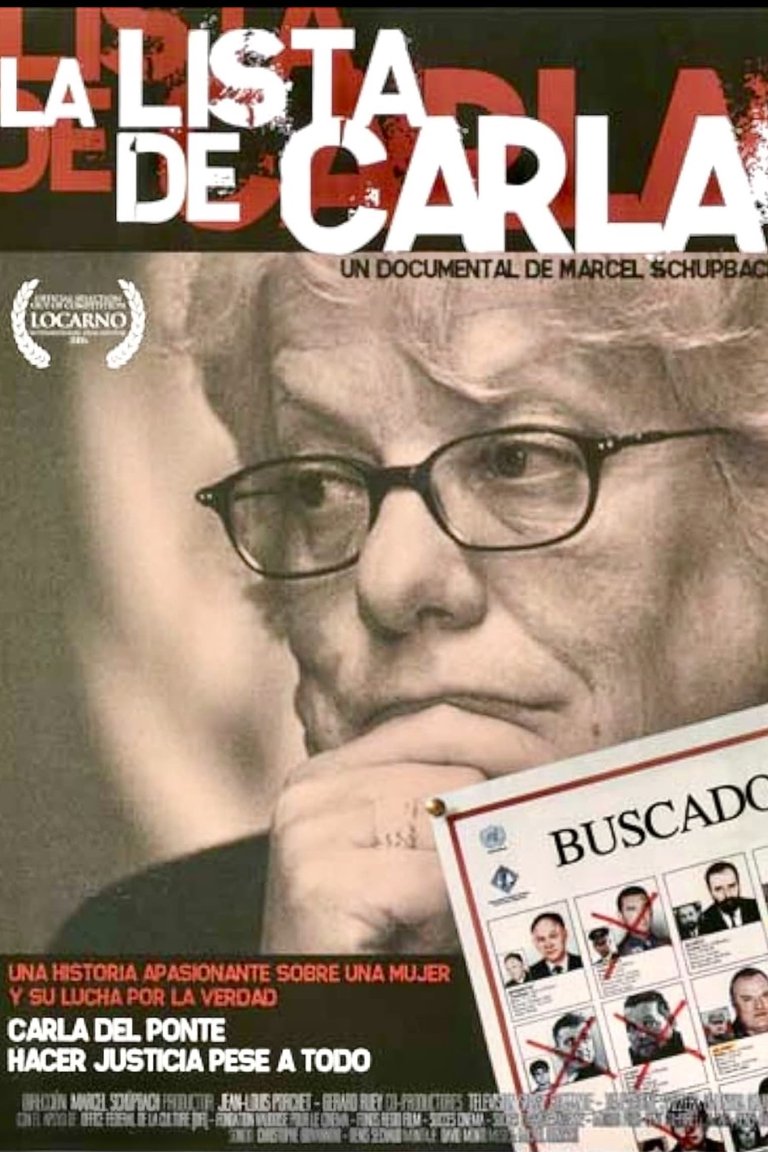Retro Film Review: Carla's List (La liste de Carla, 2006)

The aftermath of the wars that have torn apart former Yugoslavia will be the subject of a debate as contentious as that surrounding their causes. What is certain is that this aftermath also included some unlikely individuals playing an important part in the events that followed. One of them was Carla del Ponte, the former Swiss attorney general who served as chief prosecutor of the International Criminal Tribunal for the former Yugoslavia (ICTY) from 2003 until 2008. Her mandate was marked by frustration and controversies, as well as general dislike she garnered in the ex-Yugoslav countries, sometimes ironically becoming something of a uniting figure among wartime foes.
In 2006, she became the subject of Carla's List, a feature documentary made by Marcel Schüpbach for Swiss TV networks TSR and TSI. The 95-minute film aimed to portray her from a first-hand perspective, following her work and that of her closest associates in 2005, one of the more eventful years of her mandate.
Some might say that Schüpbach found inspiration for Carla's List in his native country, which is blessed with long-lasting peace, a situation that, in turn, deprived Switzerland of great leaders, national heroes, and larger-than-life figures. The prosecutor, who once challenged Italian and Russian mobsters and was tasked by the UN to bring some of the greatest villains of the late 20th century to justice, appeared to fill that void. At least, that is how Schüpbach perceived it, making Carla’s List occasionally resemble a Bond film where SuperCarla undertakes various tough, complex missions in exotic locations like Belgrade, Tivat, and Zagreb.
Fortunately, Schüpbach begins the film in a responsible manner, reminding the audience what her mission was really about. This includes scenes of Bosnian Serb general Ratko Mladić in the UN-protected Bosnian Muslim enclave of Srebrenica, shots of graves, and statements from Srebrenica women. This gives Del Ponte’s seemingly unnecessary and quixotic work, which sometimes looks like a piece of self-promotion, true context and justification.
Schüpbach illustrates this with footage that shows what the public typically does not see of the eternally stern Carla Del Ponte. The filmmakers accompany her not only on her travels but also during internal discussions among her colleagues concerning the most delicate political decisions and diplomatic manoeuvring.
Viewers have the opportunity to see how the ICTY prosecutor scornfully comments on a Croatian magazine's cover dedicated to the confession of her former lover, as well as the dilemmas that the popular Croatian general and war crimes suspect Ante Gotovina created for Croatia during the delicate start of its EU accession.
The film's most dramatic moment occurs when she publicly criticises Croatia, only to give a positive opinion on cooperation with the Hague Tribunal a few days later in Luxembourg after her colleagues mention the word "Spain," which enables negotiations to commence.
Del Ponte doesn’t deny that this is a significant risk, as once a process is initiated, it is impossible to stop. Her political advisor, Jean Daniel-Ruch, explains that with a positive assessment, her office would lose all leverage over Croatia.
Several months later, this risk proves justified, as Gotovina is arrested in Tenerife. The prosecutor celebrates, and her euphoric mood continues during negotiations in Washington a few days later.
Only a few months earlier, Del Ponte was telling Schüpbach, frustrated by the inability to capture another war crime suspect, Radovan Karadžić, that "there probably existed some agreement between the former Serbian leader and the US government.” But following Gotovina’s arrest, she appears quick to dismiss such claims after several meetings with smooth-talking congressmen and officials from the State Department and Pentagon.
However, the film, despite the hope that the author likely shared with his protagonist, does not end on a happy note. Euphoria quickly fades, just like the hopes that the institution she leads will complete its work by the end of the UN mandate.
Countries and intelligence services, whose goodwill and financial resources the seemingly omnipotent Carla Del Ponte depends on, show decreasing interest in meddling in a conflict they consider long over. The film provides the answer to why this is so with the mention of "Iraq" in the corridors of Washington, D.C.
While filming, Schüpbach likely became too emotionally drained and frustrated by Del Ponte’s ups and downs to provide a coherent epilogue. This, along with the lack of context that would make the film incomprehensible to a significant portion of viewers unfamiliar with events in this region, might be the greatest weakness of Carla's List.
The film, which was meant to showcase Carla's triumph, concludes with defeat—symbolised not only by the fact that her biggest prize, Slobodan Milošević, died before the trial's conclusion but also by the fact that Karadžić and Mladić, her most valuable targets, remained at large until the end of the film’s production.
Despite that shortcoming, and the fact that the ultimate capture and conviction of Karadžić and Mladić rendered the ICTY politically irrelevant, Carla's List should still be recommended as it represents not only a valuable historical document but also offers insights into how what went for the “international community” dealt with some of the darker chapters of European history at the end of the 20th century.
RATING: 6/10 (++)
Blog in Croatian https://draxblog.com
Blog in English https://draxreview.wordpress.com/
InLeo blog https://inleo.io/@drax.leo
Hiveonboard: https://hiveonboard.com?ref=drax
Rising Star game: https://www.risingstargame.com?referrer=drax
1Inch: https://1inch.exchange/#/r/0x83823d8CCB74F828148258BB4457642124b1328e
BTC donations: 1EWxiMiP6iiG9rger3NuUSd6HByaxQWafG
ETH donations: 0xB305F144323b99e6f8b1d66f5D7DE78B498C32A7
BCH donations: qpvxw0jax79lhmvlgcldkzpqanf03r9cjv8y6gtmk9